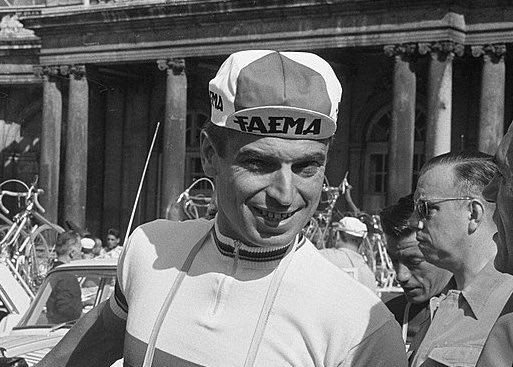
Belgian cycling is in mourning after the death of Rik Van Looy, the so-called 'Emperor of Herentals', who dominated the sprints and Classics in a career that spanned from 1953 to 1970.
Van Looy was the first rider to win all five of cycling's Monument Classics and only Eddy Merckx and Roger De Vlaeminck have since equalled that feat.
Van Looy was also a two-time world champion and was the oldest living world champion. He was expected to win a third rainbow jersey in 1963 but Belgian teammate Benoni Beheyt disregarded team tactics to win alone, sparking the infamous 'betrayal of Ronse' scandal.
Van Looy won 161 professional races, including 39 stages in Grand Tours. He was the leader of the legendary Flandria red guard, that first created a powerful leadout train and dominated racing in the early sixties.
"Rik Van Looy passed away peacefully yesterday on the birthday of his wife Nini, who passed away in January 2021, surrounded by his family after a short illness,” his family said in a statement. “The farewell will take place privately.”
Eddy Merckx was one of many to remember Van Looy. The two were briefly teammates and rivals in 1965 as the Van Looy era ended and the era of Merckx's dominance began.
"Rik was a very big champion, an absolute icon of cycling. His palmares is incredible. He was also one of the founders of the Flemish Cycling School in Herenthals. He did a lot for our sport," Merckx told the Flemish media.
"At the beginning of my career he was very difficult to beat, I had to fight hard against him. Rik was a super champion who was almost unbeatable in the classics. I am glad that I was able to race against him."
Van Looy turned professional in 1953 at just 20 with the French Gitane-Hutchinson after growing up as a delivery boy in a village near Antwerp. He went on to ride for Faema, Flandria, GBC, Solo-Superia and Willem II-Gazelle.
He won Paris-Roubaix and Gent-Wevelgem three times, the Tour of Flanders twice, Milan-San Remo once, Liège-Bastogne-Liège and the Tour of Lombardy to complete his rare set of monuments. He was world champion in 1960 and 1961.
Van Looy became a national hero in Belgium, his racing and private life captivated the media and the public at the time.
"When I go shopping, people still say: "Hello, Rik!" I think that's great," Van Looy told Sporza last year in one of his final interviews.
"All those races that are still being talked about now, that was 50-60 years ago. That shows that I have been here for a while.







